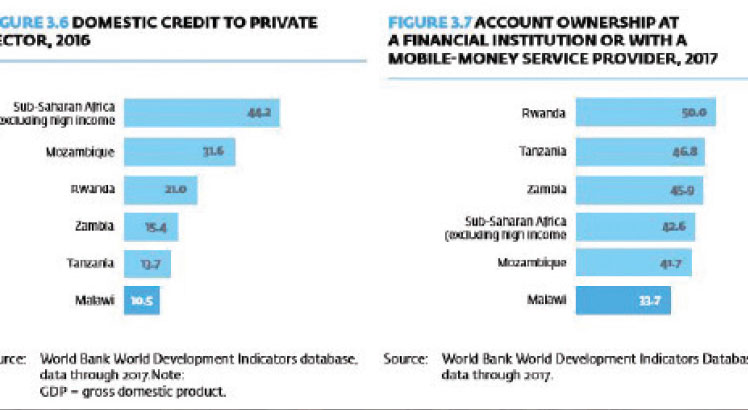World bank cautions On access to finance
The World Bank says access to finance will likely become challenging in the short-term as markets begin to absorb the effects of the Covid-19 pandemic.
In its recently published Country Private Sector Diagnostic Report, the Bretton Woods institution said Malawi’s financial sector is relatively stable, profitable and adequately capitalised, but the situation could change.

Reads the report in part: “An increase in government borrowing or an uptick in non-performing loans [NPLs] could lead to a liquidity crunch.
“Demand may also shift as firms face new challenges, increasing the need for new and improved financial services such as more short-term trade finance to de-risk transactions.”
The World Bank has since advised authorities to use this moment as an opportunity to facilitate the interoperability of digital financial transaction platforms and accelerate development of digital financial services.
The bank’s figures show that between December 2019 and June 2020, NPLs rose from 6.3 percent to 6.6 percent.
Currently, domestic credit to the private sector credit as a percentage of the gross domestic product is low at less than 10 percent compared to peers in sub-Saharan Africa where the average is at 28.4 percent, according to the World Bank.
Ironically, the bulk of credit, an estimated 90 percent of all loans by value, is extended to large firms traditionally believed to be more creditworthy.
Meanwhile, Reserve Bank of Malawi (RBM) figures show that the annual growth in private sector credit moderated to 25.3 percent in August 2021 from 27.4 percent registered in the preceding month, but was higher than 9.2 percent in a corresponding month of 2020.
On a monthly basis, the stock of private sector credit increased by K8.5 billion to K784.3 billion in August, according to RBM.
This development is explained by individual loans, foreign currency loans and mortgages which increased by K3.4 billion, K2.3 billion and K1.2 billion in that order.
Meanwhile, commercial and industrial loans recorded a net repayment of K652.0 million in August 2021.
Bankers Association of Malawi (BAM) chief executive officer Lyness Nkungula said credit demand is expected to rise in the second half of this year as economic activity picks up in view of the easing of Covid-19 cases.
She said domestic and global economic agents are now adapting to new ways of doing business to boost economic activity amid the pandemic.
“We have thus seen not only a decline in credit default rates, but also an increase in credit demand in recent months,” she said.





